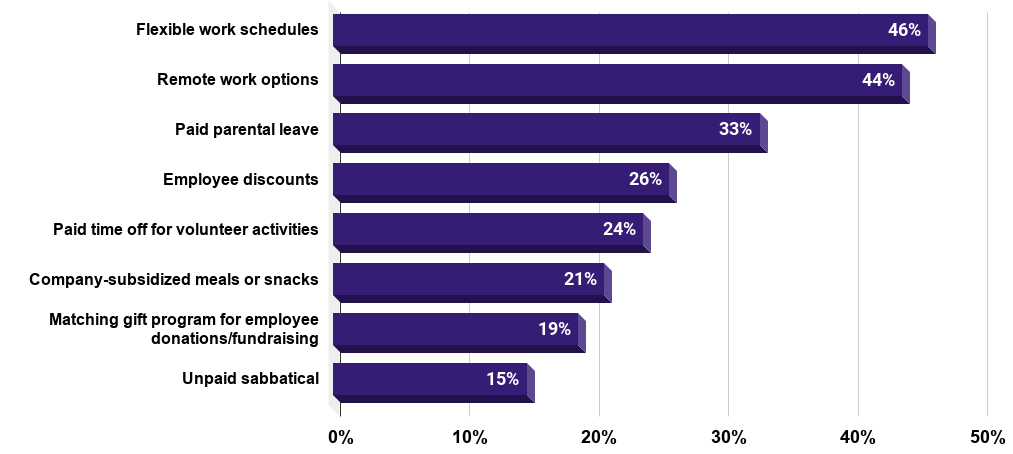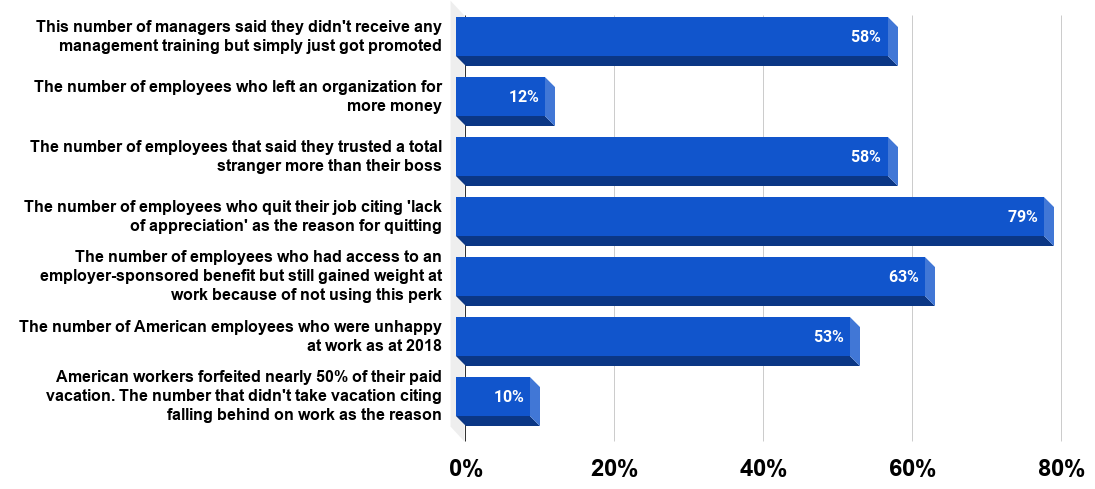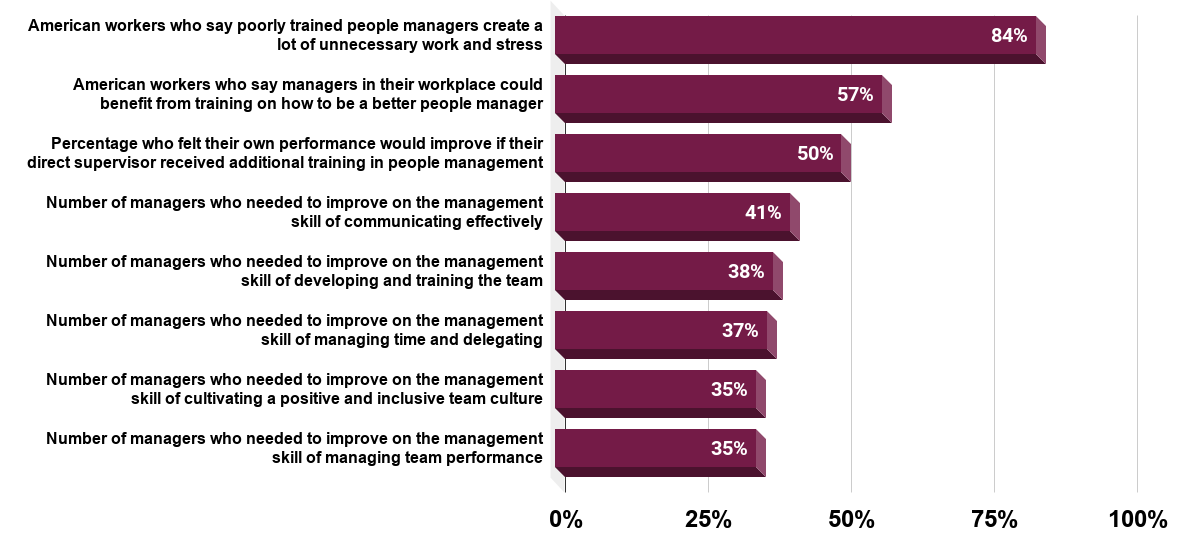What To Do When You Have A Bad Manager
WhatToGetMy Instructional Article
- Bad managers can make the workplace a nightmare for the employees that have to deal with their poor managerial skills. If you are on that ship and looking for practical ways to deal with a difficult manager, this is the article for you. This article discusses practical things to do when you have a bad manager. It also answers questions about how to handle a difficult boss.
The problem of bad managers in the American workplace.
Most common perks offered by human resources (HR) managers in North America in 2020. Source: Statista

Great managers, bosses, and supervisors make work truly enjoyable. With a great manager/boss/supervisor at the helm of affairs, you are guaranteed a one-of-a-kind work environment that is filled with the perks listed in this chart. And life will be truly amazing. Everyone will love their jobs and look forward to it every day of the week.
But alas the reality is somewhat of a far cry from this utopian expectation. This is not to say that there are no workplaces where these rosy benefits exist. But as the above chart shows, the somewhat low percentages shown on it are representative of both America and other North American countries.
Employees whose managers are open and approachable are more engaged. Source: Light House

Without good managers, employee engagement will be at an all-time low, as seen from the above survey of employees who performed at their best because they had an approachable and good manager. Poor employee engagement will always affect productivity and cost the company considerably.
According to Gallup, the problem of bad managers is such a pervasive and prevalent problem in America that it continues to cost companies billions of dollars because they keep losing some of their best employees due to having bad managers at the helm of affairs. These bad managers cannot manage employees and end up being such a pain and the bane of the workplace.
A look at the charts below paints a distressing picture of just how bad the situation of bad managers and bosses in the workplace in America is.
Some shocking workplace stats in America in 2018. Source: Forbes

57 Percent of Employees Quit Because of Their Boss (2019). Source: PR Newswire

For every 43% of employees who quit their job because of a bad manager, that company will be set back by a lot of thousands of dollars spent in recruiting to fill their vacancies and then onboarding the recruits to hit the ground running.
The issue of poor and bad managers is one that companies ought to take very seriously. But until they do, let us show you how you can navigate the tortuous terrain of dealing with a difficult manager at work.
13 Signs of a poor, bad manager.
84 Percent of U.S. Workers Blame Bad Managers for Creating Unnecessary Stress (August 2020). Source: Society for Human Resource Management

The 10 Most Common Bad Boss Traits according to a survey of 2,000 workers in Great Britain in 2017 Source: Statista

These two charts say it all when it comes to the characteristics and signs of a poor, bad manager.
Companies are largely to blame for this widespread problem of incompetent managers in the workplace. This is so because, from the 58% of managers in the 2018 survey shown in the third chart in the earlier section, it is clear that they do not train managers on the needed managerial skills to be successful at managing people at the workplace.
Being good at their job before being foisted with the managerial hat is not the same as being a good manager. It does not always follow that all good employees will make good managers. They still need to be trained and equipped with the skills needed to be good managers. It is noteworthy that two independent surveys which are two years apart would still say the same thing (the first survey is the third chart in the earlier section, and the second survey is the first chart in this section).
If you don’t know how to offer the needed managerial training for your managerial staff, let us help you. Check out our helpful article on Leadership development activities for managers for very helpful ideas.
Without proper training, these are the telling signs of a poor, incompetent, and bad manager (most of them already appear in the two earlier charts).
1. They lack effective communication skills.
A terrible manager does not know how to communicate clearly and effectively with the employees they ought to manage. This comes out in things like communicating clearly the goals and targets of the unit. It is almost as though they expect you to figure out what they want and their vision for the unit. And yet, this is not to be the case.
2. They are micromanagers.
Bad managers want to look over your shoulder at every single task they assign you. It’s almost like they don’t trust you. And that’s because they don’t. You would think or expect that once they’ve given you a task they will trust that you can do it well and deliver. They believe no one else except them is competent and able to get the work done.
A good manager would help the employees under their care grow and expand their skills. And the only way they can do that is when they are allowed to carry out the tasks they are assigned and make their mistakes without having someone looking over their shoulder at every turn.
3. They do not delegate responsibilities.
This will also happen a lot when a bad manager micromanages. Because no one else is good enough, they tend to want to do everything by themselves. And yet, they have a team that they should assign and delegate tasks to.
Given the obvious lack of trust and disinterest in trying to grow the employees under their care, they will always be swamped with work. And when they are swamped this will make them feel overworked and grumpy.
They will hate their team because they feel their team isn’t helping them. In turn, they lash out at employees and the cycle of bad management and discontent among employees continues.
4. They are also not good with time management especially in managing tasks and deadlines.
This would especially happen when they decide to not delegate tasks and do everything themselves. They would find that they are falling behind and missing deadlines. Given their perpetually full plates, they would also struggle with managing their time effectively between keeping up with work and managing their team.
5. They are not good at managing people.
This flows from their inability to delegate tasks and their propensity to micromanage. This would always put them at odds with their subordinates.
6. They are not good at training and empowering employees under their control.
A good manager knows that when their team is empowered and trained this would make their work a whole lot easier because then they don’t have to work too hard.
A bad manager on the other hand sees it in a different light. They would see it as training their subordinates to take over their work. And because they see training their subordinates as a threat to their position, they don’t train them.
7. They don’t keep track of employees’ progress and growth with targets.
Since they don’t see the value in training the employees under their care, they would also not see the point in keeping track of how much progress and growth their department and the employees in it are making.
8. They are not good with engendering a team spirit amongst the group of employees they manage.
This is also another self-explanatory trait of a bad manager. With a bad manager, you would see a lot of divide and rule amongst the team they are to be leading. They are good at having favorites and pitting coworkers against each other.
9. They are negative.
Bad managers are notorious for trash-talking and being all-around negative in the workplace. Whether this is their strategy at power play and creating a terrorizing feeling in employees, they simply are not pleasant to be around.
10. They do not foster a positive and inclusive atmosphere at work.
This goes hand-in-hand with their general negativity. A bad manager hardly has positive vibes and energy around them. In addition to being negative, they also tend to segregate amongst employees, making some feel small and left out. They would do this by picking on certain employees in the presence of everyone and making them feel small and incompetent.
11. They don’t lead by example and some are lazy.
You would find a bad manager doing things like coming late to work and leaving early. Or they would be so loud around the office. And yet frown on the same conducts if exhibited by employees. And yet they forget that by virtue of their senior position they ought to set the pace and lead by examples, especially when it comes to keeping time and simple workplace decorum, etiquette, and courtesy.
12. They are usually rude and disrespectful.
Bad managers see no issue with being rude and disrespectful in how they address employees. They tend to abuse their managerial position as an excuse to talk down on employees and make inappropriate comments and remarks about employees. In very bad cases they go as far as swearing at employees or making sexist comments.
13. They are self-absorbed.
A bad manager is always about “me, me, and me”. They are always self-absorbed and spend a lot of time talking about what they are doing and how they are doing a great job of managing while everyone else is “doing nothing” according to them.
How to deal with a difficult manager.
If you’re faced with a difficult manager who exhibits some or all of the above 13 signs of a bad manager, before deciding to quit the job, try the following strategies.
1. Identify what makes him/her a difficult manager.
This is important. Your manager could be “difficult” because they may also have a lot on their plate to deal with. Maybe they don’t know how to multitask and this makes them difficult and bad. Or maybe they are just bad at deadlines and this makes them bite your head off. Whatever their flaw or style may be, it is important to identify it as the first step.
2. Adapt to their personality.
This is why you need to identify what makes them difficult. So that it helps you adapt to their personality. Remember that learning to adapt to different personalities is an important workplace skill to acquire because you would always meet different personalities at work. And the sooner you learn how to adjust and adapt to the different personalities the better for you.
- If they like to micromanage for example, always have the smaller details ready for them.
- If they don’t like to delegate, suggest or ask them if you can help them with some tasks you can see they need to delegate. You can assure them that you will bring it for them to look over once you’re done.
- If they tend to trash-talk, find a way to make subtle humor out of it to bring out the wrongness of what they are doing without being so overt about it.
These are just a few suggestions but you get the gist.
3. Always be a step ahead of them when it comes to work.
This goes hand-in-hand with adjusting/adapting to their personality. If they always hound you at a certain time with requests and you already know what the requests they like to make are, have them ready the day before. Always anticipate what they want and stay a step ahead.
Difficult managers like to think they are not easy to figure out, but if you pay attention to their pattern for a month you will realize how predictable they can be. This will help you with anticipating what they’ll request and staying a step ahead.
How to deal with a manager who doesn’t manage.
This type of manager is the type to fall back on deadlines or not have a plan for the unit and still find a way to blame you and your colleagues for their inability to do their job.
When dealing with such an incompetent manager, the best approach is to do what they are supposed to be doing and informally assume the leadership role they are supposed to be playing.
Sure it seems unfair and would be daunting, but think of it this way. You enjoy your work and what you do. And for every blunder this manager makes by not properly managing, your unit looks incompetent. And because they are your boss they can get away with blaming you and your colleagues as subordinates.
When you indirectly assume the role they are to fill, your colleagues will silently respect you and unconsciously start looking to you for strategic leadership. Of course, your incompetent manager is too busy doing nothing they can’t even notice that you are steering things.
And don’t lose heart, it won’t be too long before your manager’s boss realizes that you are the one steering the ship and bringing about the needed results.
To avoid your incompetent manager frustrating you in trying to get things going, you can adopt the following strategies.
4. Line up your plans and suggestions as questions and present them to him/her as questions that you would like to hear their opinion on.
This kind of manager also has a fragile ego and if they sense what you are up to, they may feel threatened and make it their mission to frustrate you. You’d think that in trying to stop you from doing what they know they ought to be doing they would do it themselves. You would be in for a shocker because they won’t do anything.
To prevent this from happening, have all your suggestions and plans ready, and slowly present these to him/her as questions that you need his/her views on. But craft them sufficiently in a way that he/she would give you back what you presented as a question as the idea to run with.
Try to space these suggestions well enough. Don’t bombard him/her with so many at once. Make the changes in a small but incremental fashion.
5. Speak with your trusted colleagues to map a way forward.
In every workplace, there would be those coworkers who suck up to the boss to try and get ahead. These are the kind of coworkers you want to keep far away from your plans because they will take it back to your bad manager. Identify your trusted colleagues and discuss with them on how to come up with a strategy to manage your incompetent manager that does not want to do anything.
Dealing with disrespectful, angry managers.
For the disrespectful manager who always seems to be angry and throwing a temper tantrum, you don’t have to stand for their angry, rude, and disrespectful treatment. There are workplace ethics and rules that prohibit bosses and managers from treating employees rudely and disrespectfully as a way of showing their strength.
The Human Resources (“HR”) Department is supposed to take steps to ensure that the workplace is conducive and free of such rude and disrespectful actions.
But before you take the issue up with the HR department, try these steps first. This is because once you take the issue up with HR, it would drastically affect your relationship with your manager.
6. Once they calm down, try to find out what the specific issue or issues that got them upset is.
Maybe they were just having a bad day or also under pressure from their bosses. The only way you will know is by asking them. This would also help you to know what to avoid and what to do better next time. Ask them politely that you noted they were really upset with you and that you would like to know what it is you did wrong so that you can improve on it moving forward.
7. Calmly, politely and respectfully tell them that you do not appreciate being spoken to in the manner they spoke to you.
Even if they may have a reason for speaking to you in a rude and angry manner, it does not justify their actions. It is important to make it clear that you are not okay with how they spoke or treated you. This is because if you let it go they will think it is okay to keep treating you in that fashion, and they will continue. You don’t have to be on the receiving end of their bullying tactics or temper tantrums.
Our article on What to do when people don’t respect you has more helpful tips on what to do with a disrespectful person including a disrespectful manager.
8. Note their trigger points so that you avoid them.
Take note of this when you speak to them about what got them upset with you. Once you know what these trigger points are, try as much as possible to avoid them at all cost.
9. But don’t tolerate the bullying. If they still continue, take the issue up with HR.
This is important. Remember that you are not supposed to be subjected to a toxic and uncomfortable work environment. Take the issue up with HR. but also remember that your manager may not be happy about this. However don’t let this deter you because your mental and physical health is more important than how they may feel. If you keep letting him/her get away with it, it will affect your self-esteem and confidence at work and ultimately destroy you at work.
Dealing with demanding managers.
And then you have those managers that would call you even in the middle of the night while you are getting some sleep. Or they want you to keep working after hours even when you get off work. With such managers, set boundaries early on. You can do so by doing the following:
10. Have a work telephone number exclusively for your demanding manager.
Is this necessary you may ask? Well, unless you want to keep getting hounded on your personal line, this will be a helpful step to take. Ordinarily, you should have a separate telephone line just for work. This helps with leaving work at work and enjoying your personal space with family and friends after hours.
11. Once you get off work, turn this number off unless the nature of your work needs you to be constantly available at a whim.
If your workplace does not require you to always be available, there is no obligation on you to make yourself available after hours for a demanding manager. Once you’ve done your best and given them everything they could possibly need at work, whatever else is needed can wait until you arrive at work the next day. Work is not an excuse to be a slave or tied to a demanding manager.
12. If they ask you about this, politely tell them that once you’re home, you have other obligations that do not involve work that you need to devote the rest of your evening/day to.
In that way, you immediately establish the needed boundaries. He/she does not own you and cannot insist that you must be available at their beck and call. If they make or insist on such an unreasonable demand, take the issue up with HR.
13. Take note of the things he/she always demands from you the most and stay ahead of them in having these ready before they ask for it.
Once you know what it is they are notorious with demanding, always have it ready for them even before they ask. In that way, you don’t always have to be running helter-skelter to deal with their unreasonable demands.
Don’t be afraid to quit if things only keep taking the turn for the worse.
This is important. When you’ve tried all 13 strategies suggested here and nothing is working, it may be time to say goodbye to the job. Remember, it is not worth your peace of mind. If you need more motivation to take that bold step, let our article on 19 Signs of When to quit your job immediately give you all the right reasons why it is the right decision to take.
Frequently Asked Questions.
1. What do you do when you are working for a bad boss and how to deal with a bad boss?
Bad bosses can be a nightmare to deal with. Identify the qualities that make your boss bad and ask yourself if you can live with them. If you can, then try out any or all of the 13 strategies listed in this article. If they don’t work on improving your working relationship with him/her, then the only way out is to quit the job.
2. How to handle and get along with a difficult boss?
Dealing with a difficult boss can be another nightmare. Difficult bosses and difficult managers are just the same. You can adopt the strategies for a difficult manager listed in this article, in dealing with a difficult boss.
3. I have a problem with my boss at work, what do I do?
Identify what the problem you’re having with him/her is. If you’re having a hard time pinpointing what the problem could be, arrange for a sit down with them and politely ask them what their problem with you is. If they rebuff this, ask them if there is anything they want you to do better in working for them.
Adopt any of the strategies listed in this article and if things are still not working, then consider that it is time to give up on the work relationship and find another job and boss.
4. I have difficult supervisors at work, what do I do?
Adopt the strategy for dealing with difficult managers listed in this article, in dealing with them.
5. Boss is mean, how to deal with a mean boss?
Mean bosses are generally narcissists and in some cases, bigots. And when it comes to mean people, the best way to deal with them is to steer clear of their path or they would end up destroying you. And the same thing would happen if you stay with a mean boss. They would slowly but surely whittle your confidence and self-esteem. The best way to care for yourself is to leave the mean boss.
6. How to deal with a controlling boss?
A controlling boss and a demanding manager are just the same. You can adopt the same strategy listed in this article for dealing with a demanding manager. And if it’s still not working, then it may be time to leave the controlling boss.
7. The boss always finds something wrong, what can I do?
The sad reality is that the boss that always finds something wrong is a boss you cannot please no matter your best efforts. He/she will always find something to hold against you. You will never be fulfilled and happy working for such a boss. You will always be miserable and filled with self-doubt. The best thing you can do for yourself is to leave such a boss and find another job.
8. How can I go about confronting a disrespectful boss?
A confrontation won’t end well. Rather tactfully approach them following the steps outlined in the section on how to deal with a disrespectful, angry manager.
9. How to deal with a terrible, nasty, stressful, annoying, disrespectful, cruel, arrogant, aggressive, boss?
A boss with all these characteristics is not a boss you should be working for. It would be in your best interests to find another job.
In our helpful related article on How to get people to like you at work, we also discuss how to get your boss to like you at work. You may want to check it out.
When All Is Said And Done!
Remember that a bad manager or bad boss is not something you should put up with if you’ve tried all the strategies suggested in this article and nothing is working. The longer you keep working for a toxic and bad manager, the more harm you do to yourself. The long term negative effects are not worth it and it is better to be unemployed and happy than employed with a boss from hell and miserable and depressed.
01 HOUR 42 MINUTES
ESTIMATED TIME DESIGNING AND UPLOADING THIS ARTICLE
10 HOURS 03 MINUTES
ESTIMATED TIME RESEARCHING AND WRITING THIS ARTICLE
You Might Also Like


